Tchia is on a mission to save her father, who has been kidnapped by the evil ruler Meavora. She’ll have to explore the world around her to collect unique and rare offerings for Meavora in hopes that he’ll release her father. Fortunately, Tchia has a special ability that allows her to Soul Jump into animals and objects around her, helping her navigate the tropical environment in thrilling, mind-bending ways.
Tchia is scheduled for release in early 2023 after being pushed back from its initial Spring 2022 release date. Despite the delay (or maybe because of it), Tchia is one of the most exciting open-world games I’ve played in a long time. The world is beautiful and immersive, the physics are spot-on, and there are several unique mechanics that make it unlike any other game I’ve played.
Seamless Physics-Based Gameplay
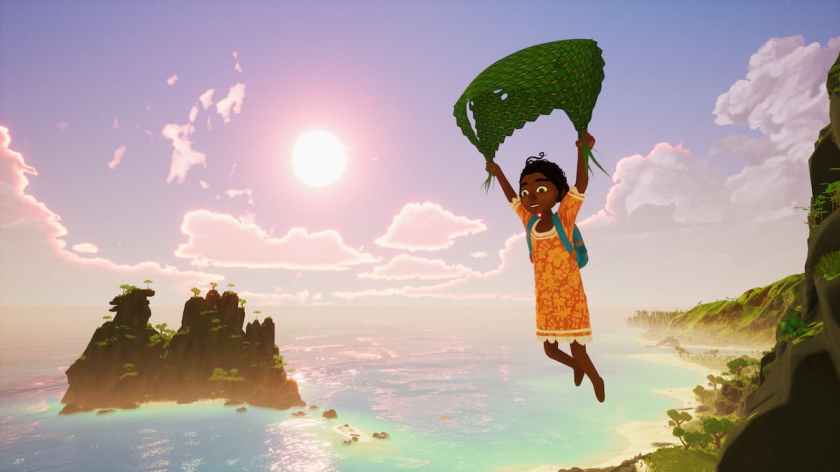
Part of what makes Tchia so immersive is its heavily hands-on interaction with the game environment. There’s no tutorial in the preview version, so navigating the tropical landscape takes a lot of trial and error (and looking at the key bindings). This made exploring the island harder than it needed to be in the early stages of the game.
For example, one of Tchia’s first tasks is to sail down the river to fetch a crab to prepare for dinner, but maneuvering the boat is more complicated than just hopping on and steering. Tchia must first pull up the anchor, set the sail to get the boat moving, and finally leave the sail to work the helm to steer the boat away from obstacles.
It took me several attempts to realize that speed and steering were two separate actions, and I ended up abandoning my boat in frustration to travel on foot for the first couple of hours. A tutorial could have saved quite a bit of time and angst, but once I knew what I was doing, the controls felt intuitive.
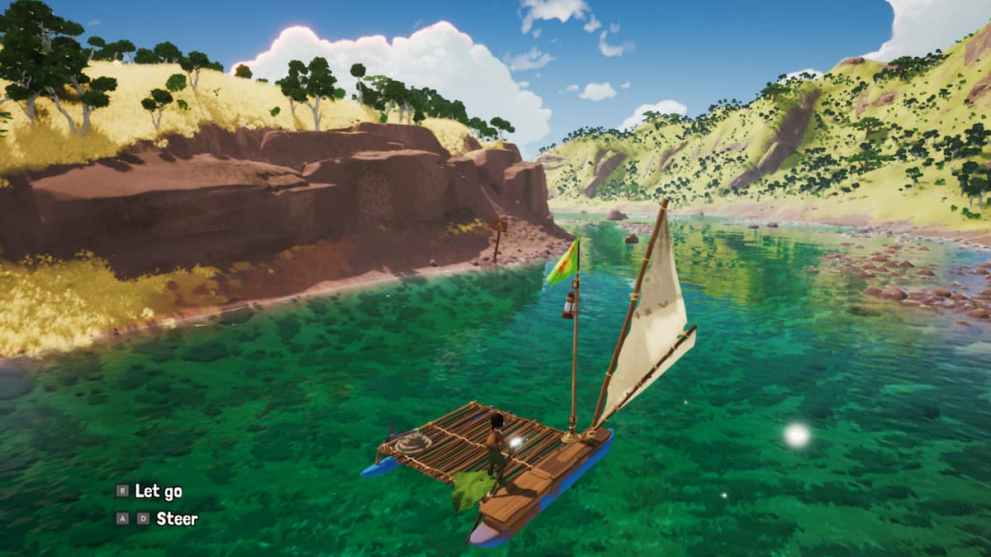
This is sort of the theme in the physics-based sandbox world of Tchia – it takes a minute to figure out what you’re meant to be doing, but as soon as you do, the physics-based gameplay feels natural and easy to control.
To explore the island, Tchia can climb mountains, sail off of them using a woven parachute, and fling herself from treetop to treetop to cover more ground faster. But climbing, swimming, or doing anything more strenuous than walking consumes Tchia’s stamina, which is also her health bar. When she runs out of stamina or health, Tchia faints, transporting her back to the last campfire where she slept.
Again, the lack of any tutorial meant that I had to figure out a lot of this through trial and error. Though I managed to conserve enough stamina to parachute Tchia down from the top of a mountain, for example, I realized I needed a new strategy after a few tries of hitting the ground and fainting from injuries.
Explore the World With Creative Solutions
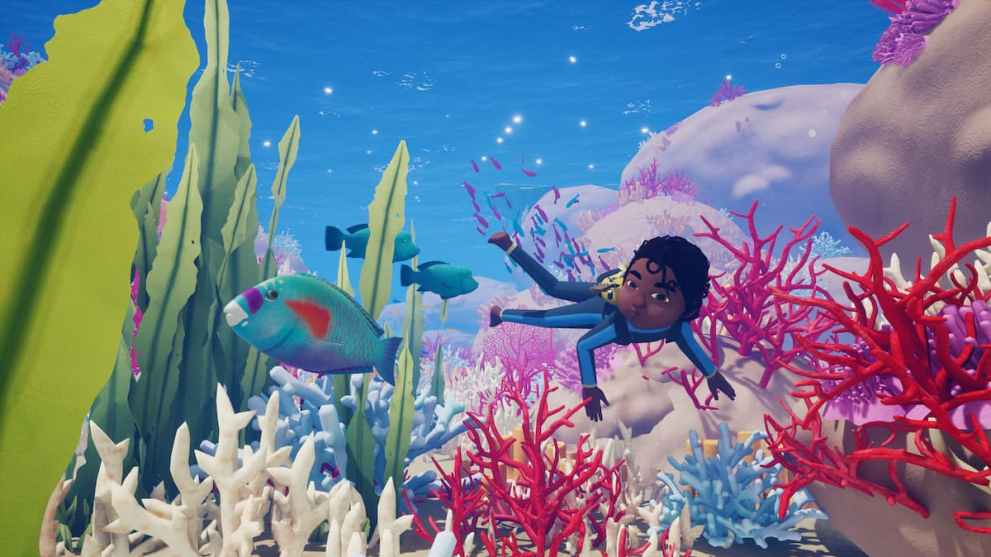
Fortunately, creative strategies abound, thanks to Tchia’s incredible Soul Jump ability. With just a couple of taps, Tchia can possess animals and objects in her environment, including birds, deer, and coconuts. Some have unique actions like sprinting, digging, and pinching, while others make navigating the world easier in various ways.
Soul Jumping is one of the most unique and intriguing aspects of Tchia, adding layers of challenge and creativity to an already exciting sandbox game. At first, I thought it might be a gimmicky game mechanic, but before long, I was Soul Jumping from one thing to another to get around the map.
By Soul Jumping into a rock, Tchia can yeet herself off the side of a mountain without injury, saving me all the frustration I experienced trying to get her down as a human girl. Instead of wasting stamina climbing, the easiest way to get to the top of a mountain is to Soul Jump into a bird and fly. And transforming into a dolphin or fish is a great way to look for underwater treasures without running out of air.
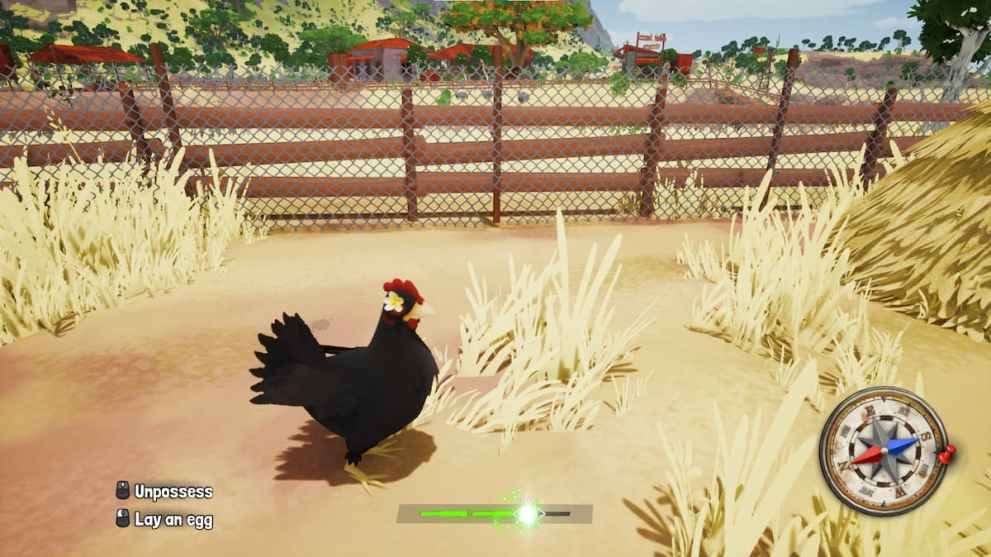
In most cases, Soul Jumping is optional, but sometimes it’s necessary to complete tasks or collect quest items. To open a treasure chest, Tchia has to possess a crab and pinch off the chain. To collect eggs, she has to possess a chicken and lay them. And to collect items from the garden, Tchia has to Soul Jump into a pig to dig them up.
Most of the game world in Tchia is friendly, with one exception – the Maano, mysterious fabric soldiers scattered across the map. Tchia must destroy them and their fabric piles by burning them, but she has to be sneaky about it. If the Maano spot her, they’ll trap her in a cage, and she’ll have to use her Soul Jump ability to escape and try again to defeat them. Fortunately, once you get the hang of Soul Jumping, the Maano are easy enough to defeat by possessing lanterns and gas cans and Soul Throwing them at your targets.
Figuring out solutions to problems requires a little bit of creative thinking, but it’s never difficult. Some games have you beating your head against the wall trying to figure out your way around an obstacle, but Tchia isn’t one of them. The game world is full of little “aha!” moments. Whenever I felt stuck on a problem, I just walked away from it and explored other parts of the island until I found a new technique or strategy to get the job done. As a cozy gamer, I loved the stress-free, no-pressure vibe of the game.
Musical Minigames
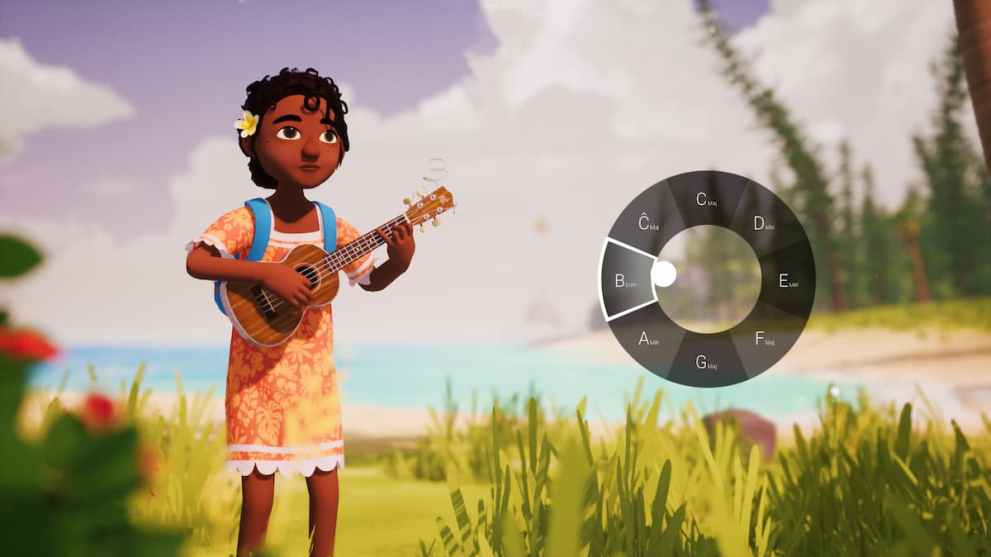
One element of Tchia that took me by surprise was the ukulele. Your first introduction to the ukulele comes during an early cutscene of a village festival where you can play along with the music in a rhythm minigame. To play, you move your cursor around a wheel of chords and click to play them.
I was impressed with the comprehensiveness of the ukulele mechanic, which is more in-depth than in most rhythm games. On PC, the scroll wheel strums, the left mouse button plucks a note, and the right mouse button plucks the same note at a higher octave. Pressing certain keys while strumming or plucking can bend the note or change the accidental (sharp or flat). Players can get wildly creative with the ukulele in free-play mode at campsites around the map.
But this musical minigame is more than just a fun diversion. Tchia can learn special songs from rock stacking challenges, and each song grants Tchia new abilities in the game environment. For example, while exploring an underwater cave, Tchia can stack rocks to learn a song that gives her an unlimited air bubble while swimming.
The only downside of the ukulele for me was its difficulty on PC. Moving the mouse accurately inside the chord wheel to click the right notes at the right time is a struggle, especially when the music is fast. I imagine it’s easier and more intuitive with a joystick and buttons. Still, after turning down the mouse sensitivity in the game settings and a little more practice, I got the hang of it. It’s just a steeper learning curve on PC than I expect it would be on console.
An Immersive Tropical Paradise
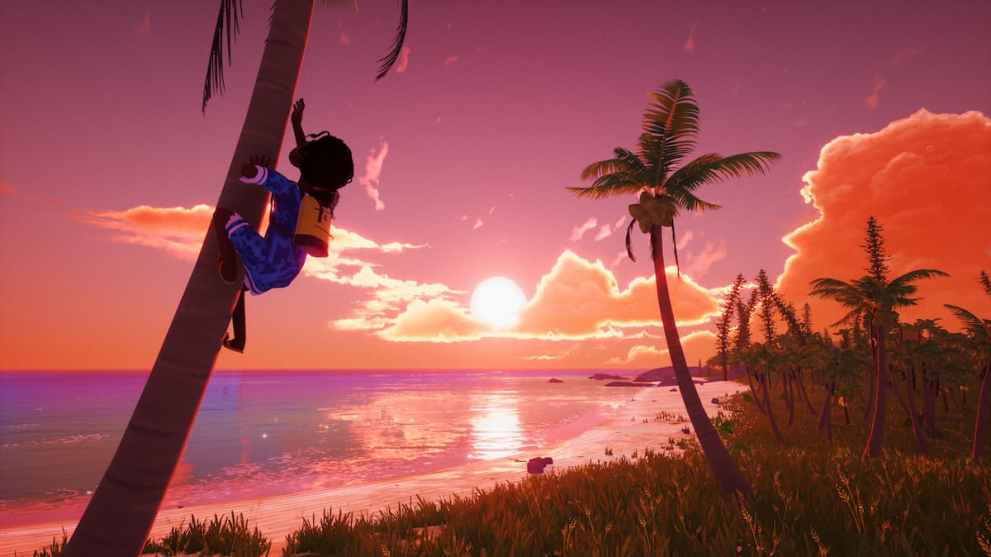
The founders of indie game developer Awaceb are from the Pacific island nation of New Caledonia, near Australia and New Zealand. Tchia’s characters, music, folklore, and landmarks are a tribute to the people and culture of New Caledonia. The game’s creators have taken the culture of their homeland and transformed it into a universally meaningful story that players worldwide can enjoy.
All the characters in Tchia are fully voice acted by New Caledonian locals in French and Drehu with subtitles in English and ten other languages, creating a fantastically immersive cultural experience. Much of the in-game landscape comes from real-life landmarks, and the developers even included natural sound effects from New Caledonia. Awaceb’s founders wanted Tchia to be a love letter to their homeland, and they absolutely succeeded.
Tchia is one of the best indie games I’ve gotten my hands on in a long time. Its vivid open-world landscape offers nearly limitless opportunities for exploration, promising hours upon hours of gameplay. The Soul Jump feature adds a wholly original way to interact with the game world, creating the kind of immersive experience you would expect from a major game studio.
Despite some delays in the development process, Tchia appears to be more than worth the wait. I’m excited to dive into the full version when it releases early this year to see how the story unfolds.

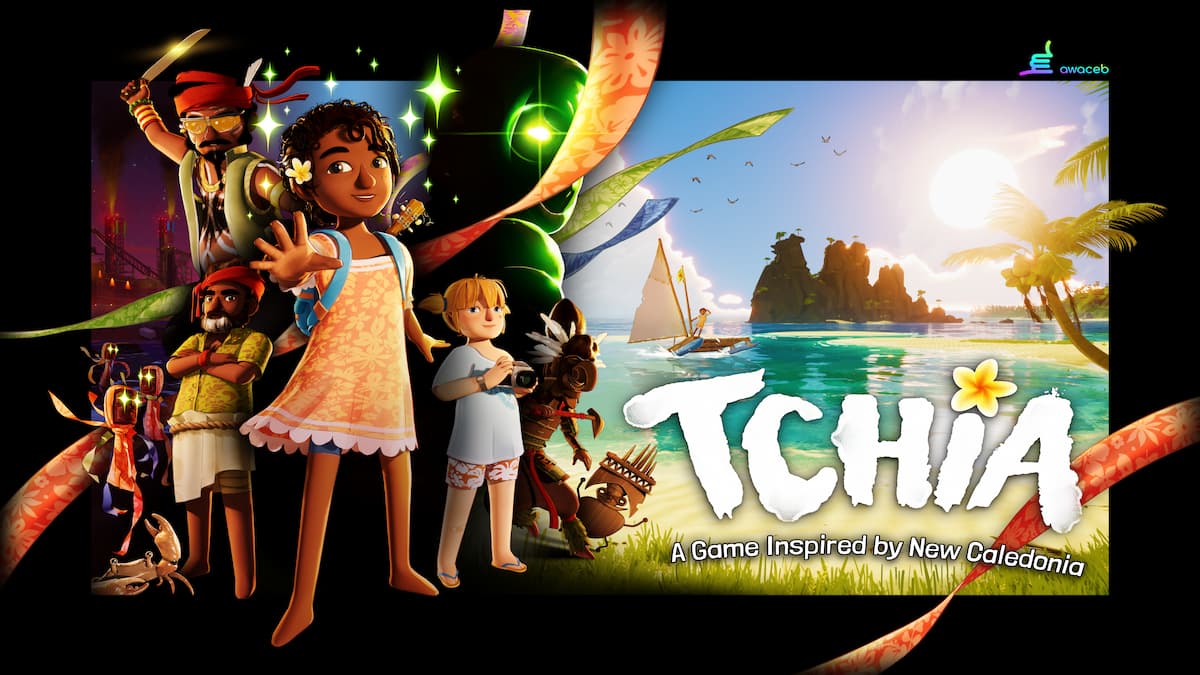











Updated: Jan 25, 2023 05:42 am